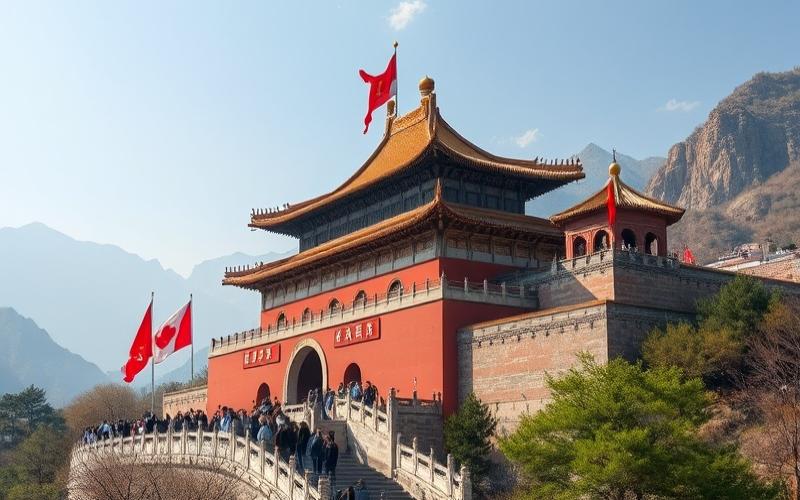
 Published on and written by Cyril Jarnias
Published on and written by Cyril Jarnias
Foreigners’ Rights in China
Foreigners’ rights in China represent an evolving legal field that reflects the complex challenges of a nation experiencing rapid economic expansion and increasing internationalization. With growing migration flows and the integration of diverse cultures, China has established a specific legal framework to manage foreign presence within its territory.
Access to legal remedies against administrative decisions is crucial to ensure fair and transparent treatment of foreigners while safeguarding national security and state interests. This article examines the available mechanisms for challenging administrative decisions, their effectiveness, and the challenges and opportunities they present within China’s current context.
Understanding Immigration Appeals in China
Immigration appeals in China allow for challenging various administrative decisions made by competent authorities, including visa refusal, expulsion, detention for investigation, refusal of temporary or permanent residence, and repatriation measures.
Examples of Appealable Decisions:
- Refusal or revocation of a visa
- Refusal of temporary or permanent residence authorization
- Expulsion or repatriation decisions
- Placement in administrative detention for verification
- Rejection of refugee status (particularly within UNHCR-managed processes)
Appeal Process Steps:
- Submission of a written application to the authorities that issued the initial decision.
- Possible appeal to higher bodies through “administrative reconsideration” procedure (复议).
- If unsuccessful, limited possibility (depending on the case) for appeal before competent administrative courts.
Competent Authorities:
- Local and municipal Public Security Bureau (PSB) offices
- National Immigration Administration
- People’s Courts (for certain disputes)
- United Nations High Commissioner for Refugees (for UNHCR-mandated refugee status determination)
Deadlines and Required Conditions:
| Type of Challenged Decision | Authority | Legal Deadline for Action |
|---|---|---|
| Repatriation/Expulsion/Detention | PSB / Court | Generally 60 days |
| Visa/Residence Permit Refusal | PSB / Immigration Administration | Varies by administrative act |
| Refugee Status | UNHCR | According to UNHCR Internal Standards |
Required Conditions:
- Be the direct recipient or have legitimate interest in challenging the decision.
- Submit a reasoned request and provide required supporting documents.
- Strictly comply with legal deadlines imposed by each procedure.
Foreigners’ Rights During Proceedings:
- Right to be informed of the exact reasons justifying the challenged decision.
- Limited but existing possibility to present observations, sometimes during an oral hearing.
- Restricted access to specialized legal assistance; few lawyers are trained in immigration rights and very few receive free legal aid in this area.
Available Resources:
- Some law firms specializing in immigration;
- Local NGOs partnering with UNHCR that can assist with certain humanitarian cases;
- Occasional support provided by local UNHCR offices for asylum seekers/refugees.
Typical Examples:
- A foreigner receives an expulsion order following illegal stay: they can request administrative reconsideration, then potentially file with a court if provided by specific law governing their situation.
- An applicant receives a negative response on refugee status: the generally available single option is internal review by the local UNHCR office; this procedure does not provide access to Chinese courts.
Applicable Law References:
| Law/Regulation | Coverage |
|---|---|
| Exit and Entry Administration Law | Visas, temporary/permanent stays, expulsions |
| Administrative Procedure Law | General administrative procedure |
| UNHCR Internal Standards | Refugee status determination procedure |
In Summary:
Procedures are primarily administrative with limited court access; they require strict deadline compliance and clear justification. Legal assistance remains scarce outside specialized NGOs or direct UNHCR intervention for refugees.
Decisions related to migration status can be challenged mainly through administrative reconsideration, with notable exceptions concerning asylum disputes where only internal review is permitted.
Good to Know:
Regarding immigration in China, foreigners can challenge administrative decisions such as visa refusal, expulsion, or residence permit revocation. Appeals generally begin with a reconsideration request to the administrative body that issued the decision, followed by possible judicial appeal before a People’s Court if reconsideration is unsatisfactory. Appeal filing deadlines vary, but acting quickly is crucial, often within 15 days of initial decision notification. During proceedings, foreigners retain the right to stay in China until dispute resolution. Legal assistance is strongly recommended, and various NGOs offer advice and support. The law on foreigner entry and exit administration codifies these appeals, and typical cases include challenging visa cancellation following alleged administrative violations.
Administrative Decisions Affecting Expatriates
Legal Framework in China Regarding Administrative Decisions Affecting Expatriates
The Chinese legal framework concerning administrative decisions affecting expatriates primarily relies on the Exit and Entry Administration Law, regulations on work permits for foreigners, residence permit regulations, and several regularly updated ministerial directives.
| Document Type | Competent Authority | Reference Text |
|---|---|---|
| Visa (entry/exit) | National Immigration Administration | Exit and Entry Administration Law |
| Work Permit | Ministry of Human Resources and Social Security | Regulation on Employment of Foreigners in China |
| Residence Permit | Public Security Bureau (PSB) offices | Regulation on Administration of Foreigners |
Types of Administrative Decisions Frequently Encountered by Expatriates
- Visa refusal or cancellation (tourism, work, study, etc.)
- Work permit refusal, suspension, or non-renewal
- Temporary or permanent residence permit refusal, suspension, or non-renewal
- Administrative expulsion or entry ban
Available Remedies Against These Decisions
– Petition to the authority that made the decision for administrative reconsideration request, generally within 60 days of notification.
– Hierarchical appeal to a superior administrative instance.
– Filing with competent People’s Court for judicial appeal (administrative litigation), generally within 6 months of the challenged decision’s notification.
| Appeal Type | Deadline to Respect | Procedure |
|---|---|---|
| Administrative Reconsideration | 60 days | Submission of request to issuing authority |
| Judicial Appeal | 6 months | Filing with competent People’s Court |
Appeal Procedure
- Draft an appeal letter in Chinese, explain reasons and provide all supporting documents.
- Provide official translation of foreign language documents.
- Seek assistance from a local lawyer specializing in administrative law or legal services of home country embassy/consulate.
Legal Implications of Administrative Decisions on Expatriates’ Lives
- Loss of residence rights, necessity to leave territory under penalty of expulsion or criminal sanctions.
- Loss of access to work, social security, health insurance, or banking services.
- Difficulties with children’s schooling or housing rental.
- Temporary or permanent re-entry ban on Chinese territory.
International Community Perception
Chinese administrative decisions are often viewed as lacking transparency and sometimes difficult to challenge fairly. Certain expulsion or visa refusal cases are perceived as arbitrary, raising recurring criticism about the absence of procedural guarantees equivalent to those in some Western countries. However, China is evolving its procedures and updating its guides to clarify expatriates’ rights and obligations.
Concrete Examples
- An expatriate whose work permit wasn’t renewed following local policy changes on foreigner quotas, without detailed explanation or possibility for quick regularization.
- A foreigner expelled for alleged non-compliance with stay conditions, despite a reconsideration request remaining unanswered within legal deadlines.
- An expatriate couple denied permanent residence permits due to strict eligibility criteria, without effective appeal avenues.
Organizations and Institutions That Can Assist in Appeal Process
- National Immigration Administration and its local branches (for visas and residence permits)
- Ministry of Human Resources and Social Security (for work permits)
- Local Public Security Bureau (PSB) offices
- Foreign embassies and consulates in China
- Lawyers specializing in Chinese administrative law
- Expatriate associations and foreign chambers of commerce
Key Takeaways
Every expatriate must be particularly attentive to deadlines and procedural requirements, otherwise the appeal could be declared inadmissible. Assistance from a local professional and cooperation with consular institutions are strongly recommended to maximize appeal success chances.
Good to Know:
In China, administrative decisions affecting expatriates often include granting or refusing visas, work permits, and residence permits, governed by the border entry and exit control law and the law on foreigners. These decisions can be challenged within 60 days through administrative review or 6 months before an administrative court. The impact of such decisions, like expulsion or visa renewal refusal, is significant as it can affect work possibilities and access to certain services. For example, a work permit refusal can force an expatriate to leave the country, impacting their career and personal life. Consulates and specialized lawyers are often required to facilitate these procedures and better navigate a system perceived as opaque internationally.
How to Challenge an Administrative Decision in China
Procedures for Foreigners to Challenge Administrative Decisions in China
Foreigners facing unfavorable administrative decisions in China have several appeal avenues, but procedures remain strictly regulated and present specific characteristics to understand.
Available Administrative Appeal Types:
- Informal Appeal: Reconsideration request addressed directly to the administration that made the challenged decision.
- Hierarchical Appeal: Petition to the administrative authority superior to the one that issued the decision.
- Judicial Appeal (Administrative Litigation): Filing with competent People’s Court if administrative appeals fail or if law permits.
Competent Courts:
| Appeal Type | Competent Jurisdiction |
|---|---|
| Administrative Appeal | Issuing Administration or Superior Authority |
| Administrative Litigation | Intermediate People’s Court of the concerned administration’s location |
For recognition and enforcement of foreign judgments, applications must be filed with the territorially competent intermediate court.
Deadlines to Respect:
The deadline for initiating administrative challenge or filing with court is generally 60 days from notification of the challenged decision.
Non-compliance with this deadline generally results in appeal inadmissibility.
Conditions and Documents Required for Complaint Filing:
- Written Request stating facts, arguments, and objects of challenge.
- Valid Foreign Passport and proof of lawful stay (visa, local police registration).
- Certified Chinese Translation of all foreign language documents.
- Notarized Power of Attorney if procedure is handled by representative, authenticated by Chinese embassy/consulate in home country.
- Depending on dispute nature, additional documents may be required (e.g., medical certificate, criminal record extract, proof of residence).
Synthetic List of Common Required Documents:
- Passport and valid visa
- Proof of local police registration
- Challenged administrative decision (original and translation)
- Memorandum stating appeal grounds
- Proof of payment for any filing fees
- Power of Attorney if applicable (with consular certification)
Importance of Local Legal Counsel:
Foreign lawyers are not permitted to plead before Chinese courts.
It is therefore essential to engage a Chinese lawyer or local firm, possibly in cooperation with a foreign firm for coordination and translation.
Mastery of procedures, language, and local administrative practices is decisive for appeal admissibility and effectiveness.
Potential Difficulties for Foreigners:
- Language Barrier (documents requiring translation, hearings in Chinese).
- Strict Formalities regarding certification and legalization of foreign documents.
- Restricted Access to Certain Appeals (some police stations refuse to consider foreigner complaints for minor offenses).
- Sometimes Lengthy Administrative Delays and lack of transparency in decision reasoning.
- Absence of Complaint Refusal Receipts in many cases, complicating proof of exhausted administrative avenues.
Recent Developments:
China continues reforming its administrative procedures to enhance transparency and efficiency, but foreigners’ appeal rights remain limited compared to Chinese citizens’.
Bilateral conventions between China and certain foreign countries can facilitate judgment recognition/enforcement or evidence cooperation.
Authorities are strengthening document compliance and translation requirements, making local counsel assistance even more indispensable.
Key Takeaways
- Scrupulously respect deadlines and formal requirements.
- Always consult a licensed local lawyer.
- Plan for translation and certification of all foreign documents.
- Anticipate practical difficulties and possible procedure length.
Good to Know:
In China, foreigners facing unfavorable administrative decisions can file informal or hierarchical appeals with the decision-making body or its superior authority, or petition administrative courts if necessary. Intermediate People’s Courts generally handle these cases. Administrative review requests must be filed within 60 days after receiving the challenged decision, and any judicial complaint will also require supporting documents such as the decision itself, valid passport and visa. Local lawyer intervention is crucial to navigate China’s legal system and overcome language and cultural barriers. Notably, recent legal reforms aim to improve access to fairer appeals for foreigners, though difficulties persist, such as strict law interpretation and procedural delays.
Disclaimer: The information provided on this website is for informational purposes only and does not constitute financial, legal, or professional advice. We encourage you to consult qualified experts before making any investment, real estate, or expatriation decisions. Although we strive to maintain up-to-date and accurate information, we do not guarantee the completeness, accuracy, or timeliness of the proposed content. As investment and expatriation involve risks, we disclaim any liability for potential losses or damages arising from the use of this site. Your use of this site confirms your acceptance of these terms and your understanding of the associated risks.

























































